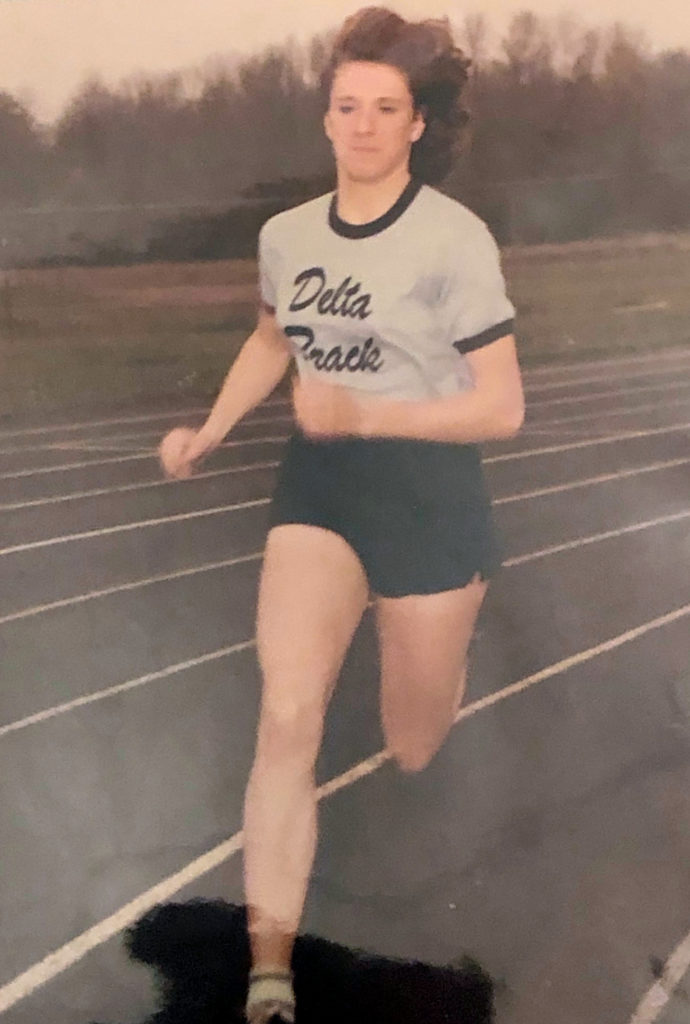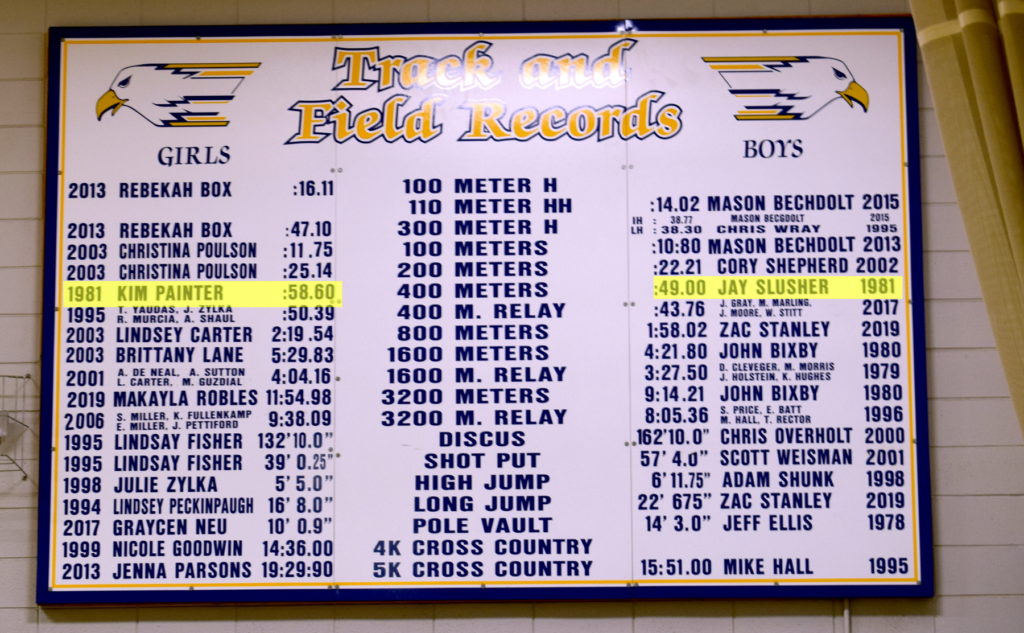By Grayson Zoller
It’s almost an inherent property of sports records that they eventually are broken. But sometimes, that just doesn’t happen. Sometimes, a record can be so impressively good that it remains for longer than anyone would have thought.
The 400-meter track and field record has stood for 40 years, for both boys and girls, at Delta High School. The records were set in the spring of 1981 by Kim Painter (58.60 seconds) and Jay Slusher (49.00 seconds).

Or at least that’s what the record board that sits atop the stairs in the southwest corner of the gymnasium claims. This story recently took a mysterious turn, as you will soon find out.
Painter, who still lives in the area and is a nurse at IU Health Ball Memorial Hospital, vividly remembers the day she got the record, during her junior year.
“I was actually in the first heat [at the state finals], and I won my heat, but the second heat was the faster heat, so they took it by time.” Painter said.

Having gotten second in both the sectional and regional competitions, she went on to get seventh place at the state finals.
“It’s surreal. … It’s kind of funny that [the record has] held all these years,” she said. “… I’m proud of it, but it would be cool to see someone break it.”
Slusher, now a physical therapist who lives in Greensburg. Ind., recounts a much different experience getting his record. In fact, he’s sure that he didn’t get the record at all.
“52.8 seconds was the best I ever ran,” Slusher said.“If I broke 50, it only would have been as part of a mile relay, and that wouldn’t count as the record in the 400.”
Which does leave the question of what happened for the board to say that he holds the record. It may be possible that there was a name mixup on the board, or perhaps a timing error from a human operator who could’ve stopped his watch early.
Current track coach Shane Conley thinks that it is possible that the records could be broken this spring. He said both senior Colten Wright and freshman Nicki Southerland have a shot at breaking the long-standing records, along with several other boys and girls.

Southerland has been a notable cross country runner this year, finishing ninth overall in the state meet and the top freshman runner in the state. She broke the school cross country record by almost two minutes in 17:35 in her very first high school meet.
But she’s also a contender to break the 400-meter record.
She hasn’t competed in the event at the high school level yet, but she ran the 400 in middle school and was about two seconds slower than the high school record.
“It’s a fast time, but I’ve been consistently putting in the work, so I believe it is doable,” Southerland said.

Wright missed the last track season due to COVID-19. Since then he has been training over the summer to stay in shape for soccer and track.
“To beat the 400-meter record would mean a lot to me. It has been my goal ever since I was a freshman in high school,” he explained.

One common thread between all these runners is that they all consider the 400-meter to be exceptionally hard.
“Your legs feel like Jell-O when you get to the last 100 meters,” Painter says, noting that she “hated that race.”.
Conley describes the legs “feeling like cement,” and that “…you turn left twice and throw up.”
A reason for this is the distance and speed required to perform well in the race. Conley said that humans weren’t really built for running that fast for that long, and by the end the body has too much lactic acid, causing your legs to feel heavy.
Most runners prefer the shorter 100- and 200-meter dashes, or a longer, more endurance based race, like the 1600 meter. This leaves the 400 in an awkward middle ground, where both endurance and speed are needed almost more than the human body can provide.
This makes it a race that not a lot of people want to run, which could be contributing to the longevity of the current records. Both current record holders were not primarily 400-meter runners, and instead got their records when their coach just made them run the infamously hard race.
“It was a grueling race. It’s a full-out sprint,” Slusher said. “It’s what those of us who weren’t quite fast enough to win the 100 or 200 would run.”
These records have stood for longer than most of the people at the school have been alive, and they could stand for longer still. However, a new generation of records could be in the making, ready to lay claim to victory over these 40-year-old accomplishments.






